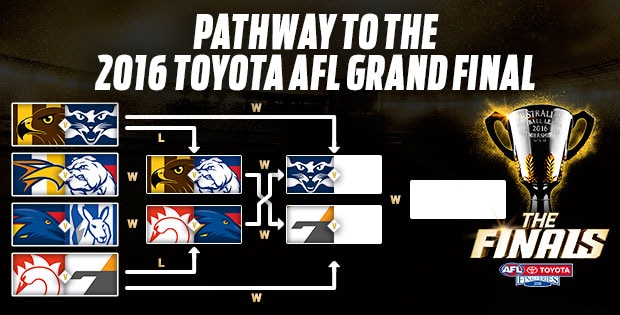1. Hawthorn can't lose contested ball significantly and win finals
Alastair Clarkson dismisses the importance of contested ball, and there's no doubt the Hawks have other priorities. But losing it throughout September could be "death by 1000 cuts", according to one assistant coach. "There's no way you can win three games in a row and lose contested ball by 30-40 in all of those games," he said. "You can't do it. It's not sustainable in finals pressure footy." The Hawks lost the contested possession count in their three finals last year (by eight, 12 and 17) but emerged on top in the statistic in the Grand Final, as they did in 2013 and 2014. They lost the count by 52 against Geelong last Friday night and only lost the match by just two points. The Bulldogs' team defence, however, will be too strong for the Hawks to just rely on their outside foot skills to move the ball. "When you're losing contests all the time you cough up a lot of field position," one assistant said. Clarkson did care about contested ball, he added, but not as much as other coaches. "The Hawks care about it to a point … and if it's wet and you're in finals and you can't control ball movement, it comes down to a lot of contests and field position."
2. The Bulldogs need to spread their team defence
Luke Beveridge's team is revered for its work rate and ability to get up and down the ground as an 18-man unit. It's a key area of their game, but at the MCG for just the third time this season they need to be aware of the width of the ground. "You've basically got a team that plays at Etihad (14 games this season) and has played its last two at Subiaco. It's hard for teams to get quick width at those two grounds," one assistant said. The Hawks are the masters of utilising the width of the MCG and the Bulldogs, who can defend "a bit skinny", will need to be on guard. "They rely on their ability to support each other and if they get pressure on the ball and force kicks loopy and high, it allows their defenders to roll off and play that zoning style," one assistant said. If the team defence is working up the ground, backmen Easton Wood and Joel Hamling will peel off their opponents and get to contests as a third man.
3. The Hawks will look for the "point of most opportunity"
The Hawks call it 'POMO' and it is the top of the goalsquare. It's where they are directing their inside 50s more and more as they rely on dangerous small forwards Cyril Rioli, Paul Puopolo and Luke Breust to do damage at ground level. "The way they've changed their game this year is they get it in deep to a tall who can create a contest and then their smalls hit in hard front and square", one assistant said. "They have been really dangerous at ground level this year." Hawthorn's ball movement and "connection" continues to be lauded, but it is their ability to lock the ball in their forward 50 that is arguably just as effective. "They keep it in there more than anyone," one of the three assistants said. "So they might only need that one chain to get it inside 50 and if they don't convert they can get two, three or four points quite quickly and then they get a goal." The other danger with the Hawks' small forwards is their ability to race back inside 50 after their teammates win possessions and kick rebound goals.
Puopolo shows some poise to set up Bradley Hill. #AFLFinals https://t.co/usJhzjLlOr
— AFL (@AFL) September 9, 2016
4. Bulldog Jordan Roughead can take a scalp in the ruck
The Western Bulldogs can get a centre square and around the ground advantage from Roughead when he comes up against Hawk Ben McEvoy. "The ruck is a weakness for Hawthorn and I think Roughead is going better than McEvoy in the ruck … he's hitting in," a midfield assistant said. "Jon Ceglar was easily their No.1 ruckman before getting injured and I reckon Roughead has got a real opportunity to take the honours and get the ball going the Doggies' way." According to another assistant, young Bulldog Tom Boyd will be a valuable support ruckman with seven hit-outs a game this season and a competitive edge in recent weeks. McEvoy's value could be when forward, forcing contests to bring the small forwards into the game.
Clay Smith was the beneficiary of some strong work from Tom Boyd. #AFLFinals #ohwhatafeeling https://t.co/glugaFx3Xt
— AFL (@AFL) September 8, 2016
5. The Hawks will bring a forward up to stoppages to cause chaos
A tactic that is becoming more common for the Hawks is to bring a forward up the ground for wing stoppages and position them parallel to contest in the corridor. If they lose the stoppage, that player runs back to support the defence. If they win, his teammates instinctively know to look for him in the middle. "Because of their foot skills and the fact they move the ball quickly, they get it out to him," one assistant explained. The move forces one of three plays from the opposition – either a defender follows him up the ground, they let him go free, or one of their own forwards comes up the ground to man him. The last of those options leaves the Hawks with a spare man in defence, which they love. "It'll be interesting to see if the Bulldogs follow up that Hawthorn forward or whether they leave him and the Hawks can get it out to him nice and quickly," the assistant said. "It wouldn't surprise me this week if they played Bradley Hill or someone out there if the Bulldogs aren't going to come out to him."



